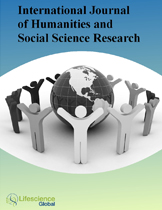ijhssr
|
|
Abstract: The paper focuses on images of identity in Southeast Asia and argues that it is analytically useful to distinguish these identities and their “modes of representation” at different levels or scales of magnitude. In this regard, it is necessary to examine images of nationhood or the identities expressed and displayed at the national level in interaction with identities at the sub-national level which comprise what are usually referred to as ethnic groups or alternatively “peoples” or “communities”. Identity and its specific expression in “ethnicity” comprises a form of social cleavage and is a means of organizing social and cultural relations and encounters in terms of similarity and difference. It is argued that identity cannot exist apart from the establishment and maintenance of “cultural difference” and the construction and operation of boundaries, and is generated and sustained in relationships, both at the level of ideas and in practice with others who are perceived to be and categorized as “not us” or “other”. In other words, the ways in which identity and ethnicity in particular operate are “relational”. Comparative case-studies are taken from Singapore, Malaysia and Thailand to illustrate these propositions. Keywords: Identity, nationhood, ethnicity, classification, Singapore, Malaysia, Thailand. |
|
|
Abstract: Ethiopian nationals living in the Kingdom of Saudi Arabia (KSA) have been compelled to leave the country for causing an increase in the number of unemployed nationals of KSA. The crackdown was planned to create jobs for Saudi nationals by reducing the number of foreign workers. Due to the crackdown of illegal residents by the police, more than 140,000 Ethiopians returned home, as of December 22, 2013. Returnees were duly sent to their families as they arrived in Ethiopia by the provisions of IOM1 with overnight accommodation. However, reunification of returned migrants to their family and social environment has not been easy. Challenges of reintegration of the returnees to the main stream society vary across individuals. Emotional, health, psycho-social, and feelings of failure to meet family expectations take the lion’s share to determine the likelihood and extent of reintegration of returnees. Success to reintegrate depended on whether their migration experience abroad was successful, how they have integrated in the host society and what migration experience they have returned with. The challenges to reintegrate with local people came up with another migration; both intra-national and international. Returnees who did not appropriately reintegrated with the sociocultural environment are found vulnerable to substance abuse, alcoholism, and prostitution. Hopelessness, social isolation and development of low self-esteem prevail in the Saudi Arabian returnees. This study uncovered that reintegration of forced-returned migrants in their country of origin is a tough process. It is more likely to result in another migration and develop socially undesirable conducts. Keywords: Challenges of reintegration for return migrants, consequences of illegal migration |
|
|
Abstract: There is much research that illustrates the “glass ceiling” effect for women in elite leadership positions. Examining female academic chairs’ leadership in a male domain provides insight into leadership practices. The author interviewed three female clinical chairs and integrated the findings into a women's leadership model. Deconstructive thematic analysis of the subsequent text gathered systematic and in-depth information about this case at a U.S. top-tier academic medical center. A deconstructive view suggests that women leaders will be both masculine and feminine, that gender is not an issue although issues were identified by their laughter, that communal behavior may be considered a weakness but became their strength, and that threat may be “in the air" but not noticed. All three female chairs simultaneously accommodated and resisted constructs within the literature. All the barriers described in a model of women's leadership were dismantled by these successful women chairs. Keywords: Deconstruction, gender, leadership, qualitative, social role theory, academic medicine. |
|
|
Abstract: This paper presents the nuclear options for Turkey’s energy future while comparing the other available energy sources. Firstly, importance of sustainable energy sources and policies are discussed. Should existing energy policies which formed mostly by importing energy (natural gas) from the neighbors’ countries continue or should find different alternatives such as local energy sources (wind and solar energy) and nuclear energy be evaluated. Then, the potential of the local renewable sources convenient for Turkey, such as wind and solar are investigated and compare with the nuclear energy. The advantages and disadvantages of nuclear energy usage, as well as the place of nuclear energy in electricity production in the world are scrutinized. It is clear that the usefulness of nuclear energy and nuclear power plants depend heavily upon the progress in technical developments. Improving technology on operation systems and waste problems of them brings more secure and more environment friendly power plants. Finally, our current energy consumption and energy need in short and medium term (+50) conducted for the evaluation of nuclear power plants are discussed.
Keywords: Nuclear energy, wind energy, solar energy, Turkey. |
|
|
Abstract: Evidence on uses of free time in non-Western societies exposes and forces us to address several boundary problems in leisure studies. A combination of qualitative and quantitative evidence from nationally representative samples of 15-29 year olds in Algeria, Egypt, Lebanon, Morocco and Tunisia finds some familiar divisions in the age group’s use of free time – by social class and gender. However, the evidence also reveals some region-specific features: namely that for many young people free time is less clearly separated from the rest of life than in Western societies, work and play are frequently fused, and religious and political participation are sometimes pivotal in young people’s bundles of free time activities (youth sub-cultures). Keywords: Arab, free time, leisure, leisure studies, youth. |


